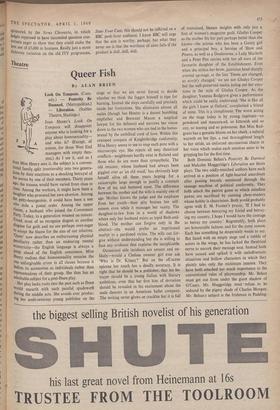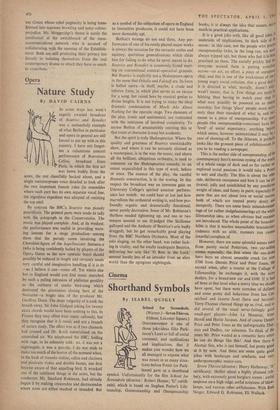Theatre
Queer Fish
By ALAN BRIEN
Look On Tempests. (Com- edy.) — Posterity Be Damned. (Metropolitan.) — Liberation. (Stables Theatre, Hastings.) JOAN HENRY'S Look On Tempests will disappoint anyone who is looking fcir a play about homosexuality— and who is? (Except, of course, for those West End managers with empty thea- tres.) As I see it, and as I lust Miss Henry sees it, the subject is a conven- tional family u split irretrievably into two genera- tions by their reactions to a shocking betrayal of the norms by one of their members. Thirty years 40, the trauma would have varied from class to class. Among the workers, it might have been a daughter who procured her own abortion. Among the Petty-bourgeoisie, it could have been a son Who stole a postal order. Among the upper classes, a husband who joined the Communist Party. Today, to a generation weaned on instant- 7eud, most of us recognise disgust as another ulsguise for guilt and we are perhaps over-eager toaccept the blame for the sins of our relatives.
‘
Queer' now describes an embarrassing physical Peculiarity rather than an endearing mental eccentricity—the English language is always a lump ahead of the English conscience. Miss Henryn realises that homosexuality remains the °no unforgivable crime in all classes because it indicts its accessories as individuals rather than representatives of their group. She thus has an admirable subject for a post-lbsen play. Her play lacks roots into the past such as Ibsen Would unearth with such painful spadework during the middle acts. She avoids ever produc- ing her ambi-sextrous young publisher on the stage so that we are never forced to decide whether we think the faggot himself is ripe for burning. Instead she stays carefully and precisely inside her limitations. She eliminates almost all males (though Ian Hunter is a decent bumbling stepfather and Brewster Mason a sceptical lawyer for the defence) and narrows her vision down to the two women who are tied to the homo- sexual by the umbilical cord of love. Within this cramped compass of Knightsbridge conformity, Miss Henry seems to me to map each pore with a microscopic eye. She rejects all easy theatrical conflicts—neighbours hardly exist in flatland and those who do are more than sympathetic. The old retainer, whose husband had always been giggled over as 'an old maid,' has obviously kept herself alive all these years hoping for a catastrophe large enough to justify a constant flow of tea and buttered toast. The difference between the mother and the wife is mainly one of age. Mother knows the judge and the employer from her youth—their pity bruises her self- esteem even while it massages her vanity. The daughter-in-law lives in a world of shadows where only her husband exists as tepid flesh-and- blood. The mother can forgive only in the abstract—she would prefer an imprisoned martyr to a pardoned victim. The wife can for- give without understanding but she is willing to face any evidence that explains the inexplicable.
Occasional side incidents are unsure and un- likely—would a Chelsea sweater girl ever ask 'Who is Dr. Kinsey?' But on the off-scene epicene her touch has a deadly accuracy. It is right that he should be a publisher, that his be- trayer should be a young Italian with literary ambitions, even that her first hint of deviation should be revealed in his excitement about the male dancers in an American ballet company. The writing never glows or crackles but it is full of restrained, literate insights with only just a hint of woman's magazine gush. Gladys Cooper as the mother fits her part perhaps better than she knows—the actress who has been a Gaiety girl and a principal boy, a heroine of Shaw and Pinero, as well as a Desdemona, a Lady Macbeth and a Peter Pan carries with her all aura of the favourite daughter of the Establishment. Even when she strikes her brow, patrician head sharply averted up-stage, at the line 'Times are changed, so terribly changed,' we see not Gladys Cooper but the well-preserved mama acting out her emo- tions in the style of Gladys Cooper. As the daughter, Vanessa Redgrave gives a performance which could be easily underrated. 'She is like all the girls I knew at Oxford,' complained a friend of mine. This is a compliment. The worst acting on the stage today is by young ingénues—so powdered and mascara-ed, so kittenish and so coy, so teasing and so poisonous. But Miss Red- grave has a genuine bloom on her cheek, a natural warmth on her lips, a real thoroughbred length to her stride, an unforced unconscious charm in her voice which makes each emotion seem to be gripping her for the first time.
Both Dominic Behan's Posterity Be Damned and Malcolm Muggeridge's Liberation are thesis plays. The two oddly-matched authors have each arrived at a position of light-hearted anarchism after passing bravely unminced through the sausage machine of political conformity. They both attack the patriot game in which mindless pawns are sacrificed by cunning chess-masters whose hobby is chauvinism. Both would probably agree with E. M. Forster's prayer, 'If I had to choose between betraying my friend and betray- ing my country, I hope I would have the courage to betray my country.' Regrettably, both plays are honourable failures and for the same reason. Each has something he desperately wants to say. But faced with an empty stage and a rabble of actors in the wings, he has lacked the theatrical nerve to uncork their message neat. Instead both have sauced and spiked it with melodramatic situations and hollow characters in which they plainly take only the minimum interest. They have both attached too much importance to the conventional rules of playmanship. Mr. Behan must get out from under the giant shadow of O'Casey. Mr. Muggeridge must-refuse to be seduced by the pigmy shade of Charles Morgan. Mr. Behan's subject is the Irishman in Padding- ton Green whose rebel pugnacity is being trans- formed into taproom brawling and noisy colour- prejudice. Mr. Muggeridge's theme is surely the intellectual at the switchboard of the mass- communications network who is accused of collaborating %la' the enemies of the Establish- ment. Both are, still protecting their privacy too fiercely in isolating themselves from the real contemporary drama to which they have so much to contribute.



































 Previous page
Previous page